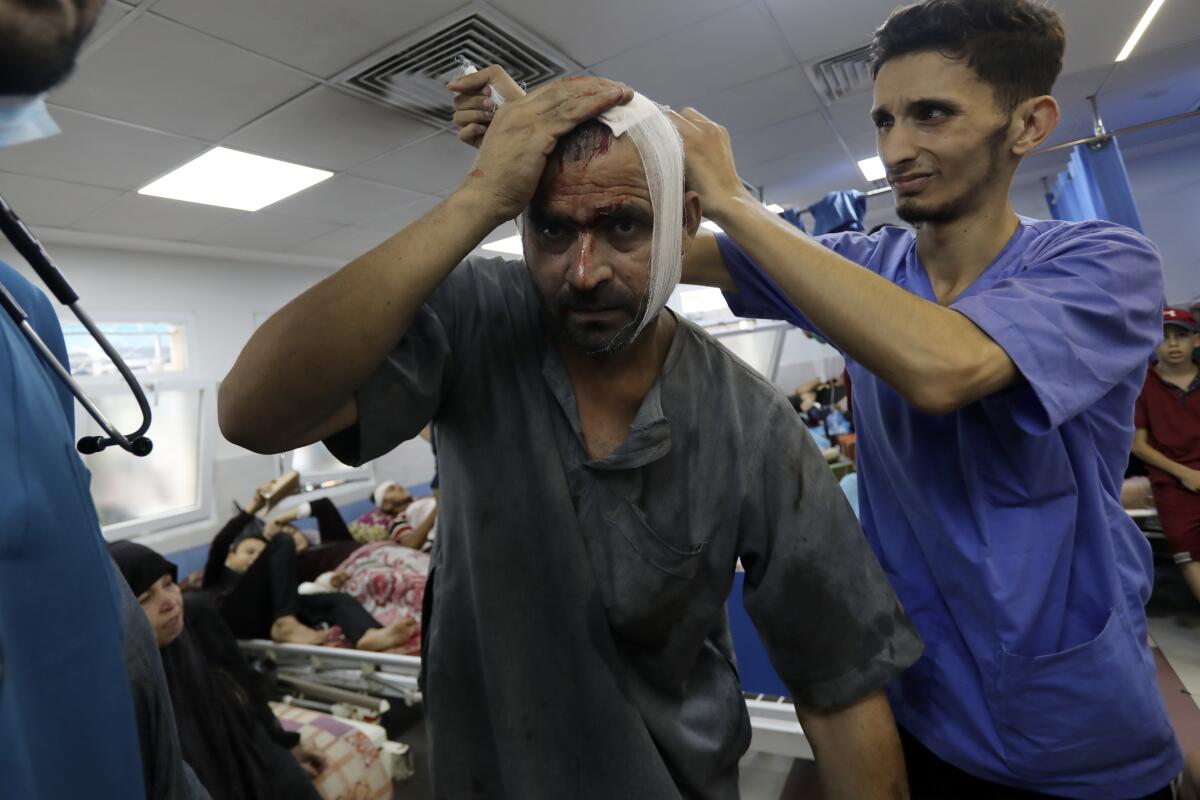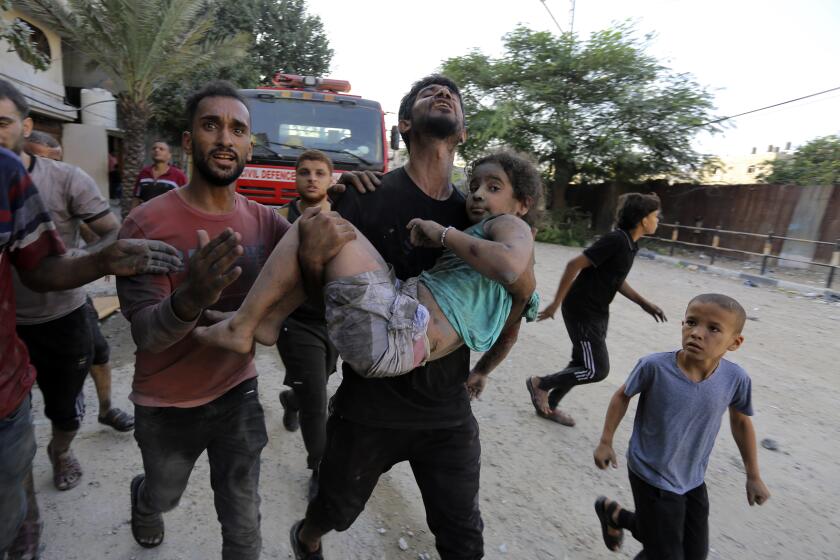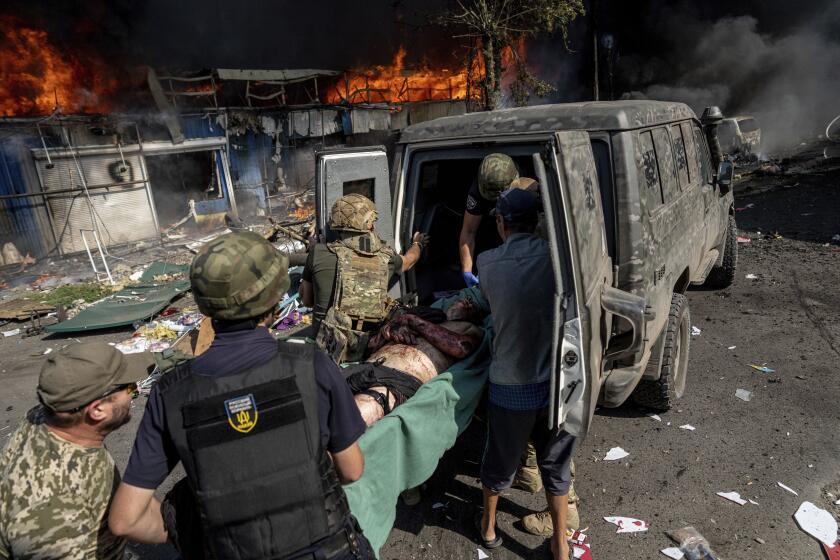Editorial: Cease-fire now. The killing in Gaza must stop

It has become impossible to distinguish between Israel’s decidedly non-surgical operation against Hamas militants in Gaza and the indiscriminate killing of Palestinian civilians. When so-called humanitarian pauses in the bombardment and ground operations are too brief to realistically permit innocents to flee, or when there is no place for non-combatants to go that is not also in the line of fire, such pauses are so deficient as to be meaningless.
It is time for a cease-fire. It is time for the Biden administration to assert strong and sustained pressure on the government of Benjamin Netanyahu to stop attacks that have reportedly already killed more than 11,000 Gazans. The world cannot stand by to witness more slaughter of civilians.
Israeli forces warn Palestinians to flee parts of southern Gaza, as internet and phone services collapse across the territory. A hostage’s body is found.
No one should harbor illusions about Hamas, the radical militant organization that serves as the de facto Gaza government and began the current hostilities with its murderous Oct. 7 surprise attack on Israeli civilians. Militants killed about 1,200 people and continue to hold more than 200 hostages — Israelis, Americans and others.
Israel claims Hamas has used Shifa Hospital as a command center and weapons warehouse. Although Israeli soldiers who entered the hospital were able to produce little evidence of that, there is no reason to doubt that Hamas would treat Palestinian civilians as human shields.
But Hamas’ atrocities do not justify atrocities in kind. Following Hamas’ initial attack, Israel instructed the people of northern Gaza to leave their homes and made no commitment that they would ever be able to return. Israel’s reprisal destroyed homes and cut off power and communications, making it impossible for survivors of the bombing even to search for the remains of family and neighbors beneath the rubble.
The doctors I’ve worked with to build an advanced pediatrics system in Gaza now find that dream shattered. Children can’t get even the most basic care.
Now Israel is signaling that it will step up its assault in southern Gaza, into which much of the territory’s population of more than 2 million have crowded in response to the warnings to flee the north. They will not be permitted to enter Egypt on Gaza’s southwestern border, and they cannot enter Israel. They are trapped.
Already, more children have died in Gaza in the last month than in all other conflicts around the world this year, according to Save the Children. That cruel fact is one of many that have turned world opinion against Israel, and against the U.S., its chief ally and the provider of most of its weapons. The consequences for both nations will last generations. The trauma inflicted on Palestinian survivors only increases the recruiting ability of Israel’s enemies, whether they be Hamas, Hezbollah or any successors bent on destruction of Israel.
Conflicts now raging around the world have significant differences, but they are also connected.
On Wednesday, the United Nations Security Council approved a resolution calling for “urgent and extended humanitarian pauses and corridors” in Gaza for “a sufficient number of days” to allow unhindered access for agencies delivering aid. The U.S. did not vote in favor of the resolution, but importantly, also did not veto it. Still, pauses and corridors mean little if they are immediately followed by a resumption of deadly attacks.
Secretary of State Antony J. Blinken testified at an Oct. 31 Senate hearing that a cease-fire would “simply consolidate what Hamas has been able to do and ... potentially repeat what it did another day.” But neither Israel nor the U.S. has explained how Hamas can be eradicated or removed from power without an unacceptable level of civilian deaths and casualties. Nor have they set forth what they intend to happen next. Israeli occupation?
The invasion changed the course of my life and my family’s, writes Times TV critic Lorraine Ali. Twenty years on, its aftermath is still playing out.
On his visit to Israel in the wake of Hamas’ initial attack, President Biden noted that the U.S., following the terrorist attacks of Sept. 11, 2001, made mistakes. The statement was a clear message to Israel: Don’t blunder as we did. Don’t squander the goodwill of the rest of the world by killing civilians. Don’t mimic your enemy’s cruelty. Don’t leave a power vacuum that can be filled by other, even more potent enemies. Have an exit strategy.
Remaining mindful of America’s mistakes, it is incumbent upon the Biden administration now to avoid complicity with Israel’s. We are past the time to excuse the horror in Gaza. Biden has to press Netanyahu hard to stop the mass, indiscriminate killing. That starts with a call for a cease-fire.
More to Read
A cure for the common opinion
Get thought-provoking perspectives with our weekly newsletter.
You may occasionally receive promotional content from the Los Angeles Times.














